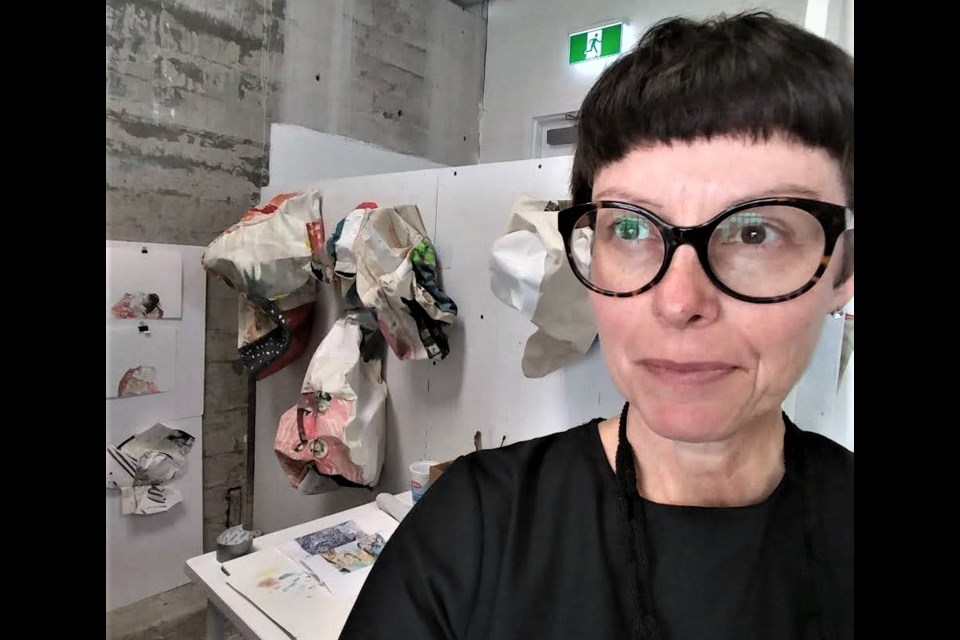ORILLIA MUSEUM OF ART & HISTORY
********************
The Orillia Museum of Art & History's (OMAH) History Speaker Series recently presented a bonus talk on Zoom, where art meets history: Let the Fur Fly: Past and Contemporary Histories of Fur, Fashion and Friction.
Hosted by OMAH’s Art and History Program Coordinators, Tanya Cunnington and Lindsay Earle, guest panelists shared their respective points of view on the impact of the fur trade in Canada.
The artist viewpoint was shared by current OMAH exhibitor, Jill Price, a PhD candidate in Cultural Studies at Queen’s University whose exhibit currently at OMAH, “Unfurled: Unsettling the archive from a more-than-human perspective,” speculates on how animals might choose to engage with, frame, label and question material objects held within the archives of museums.
Her belief is if it wasn’t for the fur trade, we may have been similar to the multiple countries within the European Union, as Canada is a vast, geo-diverse territory with regional cultures. Ultimately, we had colonization, because if it was not fur then there were other resources to extract from across the country.
Price explained that from a focus on the animal perspective, namely the beaver point of view, they no longer had a voice. Animal numbers were dwindling as they were aggressively hunted by humans, who took their fur and wore it differently. They saw their habitats destroyed with trees being chopped by settlers to build their homes, which depleted their resources and saw ponds dry up.
The historic perspective of the settlers was presented by local amateur historian John Savage, a descendent of Antoine Gaudaur, who moved to Orillia after his days as a North West Company voyageur and War of 1812 veteran. He married Mary Shilling, daughter of Chief Big Shilling, and became Orillia’s first settler family.
Savage explained that the fur trade was a vast commercial enterprise, initiated by Samuel de Champlain in 1609, that spread across the wilderness in what is now Canada. The Indigenous peoples who had hunted and worn furs for thousands of years became key players in this alliance.
Savage’s belief is that the fur trade had far-reaching impact on how Canada has evolved. The monopolies versus the “small guys” have been going on since the beginning of European settlement of this country.
Ecology is a natural, sustainable economy as was seen by the Indigenous people in balance with nature. However, the European perspective with humans on top of the natural order, exercised the right to extract as much natural resources as they needed.
The disposition of hunting grounds and resources employed Indigenous people during the fur trade became marginalized once their land was taken away. Our economy has been dependent on resource extraction. However, we are seeing the impact now with loss of old growth forest, climate change, floods and droughts.
Today, the fur trade is still active in Canada with this country being one of four countries with wild trapping and fur farms. Toronto stills hosts an annual North America Fur Trade auction for the sale of wild fur.
Fur farms account for 70 percent of the Canadian fur business versus wild hunting. Fur farms limit the economic opportunity of Indigenous and traditional trappers in remote areas. While there has been public interest for a moratorium on mink farming, there is support for the Indigenous traditional ways to source furs for ceremonial use.
The presentation’s Q&A format and discussion that ensued, demonstrated how history can work its way into creative practice. One of OMAH’s mandates is to include both art and history in what we do, and this presentation, was the perfect fusion of both.
If you weren’t able to attend the presentation and want to hear the full story, it is now available on the OMAH’s YouTube channel. Click here to view the presentation.
In the OMAH gift shop, there are some fur-clad pieces of original art and figurines that Jill Price has created from reclaimed fur. Be sure to see Price's exhibit at OMAH, "Unfurled: Unsettling the archive from a more-than-human perspective”. Unfurled utilizes objects and materials held within OMAH’s historical collection. OMAH is now open Tuesday to Saturday 11 a.m. to 4 p.m.
The History Committee Speaker Series will take a brief hiatus over the rest of the summer and resume on Wednesday, Sept. 15 at 7 p.m. with guest speaker Dr. Chris Decker. His talk “Dr. Norman Bethune: Communist, Humanitarian, Innovator, Muskokan,” will cover the life and times of Dr. Norman Bethune: a hero in the People’s Republic of China. To learn more about this remarkable man, click here to register or call Monica at 705-326-2159 or email [email protected]
The History Committee thanks you for your amazing support for our virtual History Speaker Series. Have a safe and enjoyable summer.
********************
